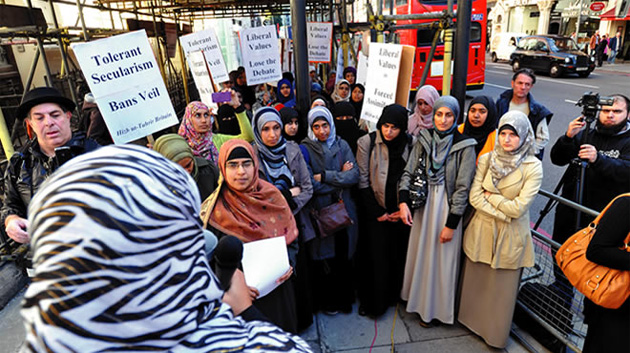Christianity vs. Islam (Part 6)
Can Brother Religions Come to a Compromise? Transcending Exclusiveness and Tolerance
We have looked at the long adversarial relationship between Christianity and Islam, but because it involves issues that have bearings on the foundations of the both faiths, the situation cannot be resolved overnight.
There are, however, things that can be done. Christian countries, with America at the core, need to review the war on terrorism, which has involved the killing of civilians of Islamic nations (see the following pages).
As far as Islam is concerned, it needs to modernize (not necessarily Westernize), alleviate the frustration of people in secular regions, and work towards social stability and progress. In doing so, it can quell feelings of jealousy towards the West.
One point to modernize is the status of women. Isobel Coleman, who makes policy proposals on Middle East issues and is a senior fellow for the American think tank named The Council on Foreign Relations, analyzed the movement to improve the status of women in the Middle East for a story published by her think tank’s specialist magazine “Foreign Affairs”:
“The education level of women in the Middle East is rising, with the number of women going to work and earning a salary also increasing. I think this will improve the status of women and greatly change the culture in the Middle East.
However, religious conservatives all through the Middle East are still very powerful and are strongly opposed to such changes. For this reason, the women’s movement is taking the stance that argues within the framework of Islam that ‘the fundamental values of Islam are consistent with improving the rights of women and so the original scriptures should be revisited and reinterpreted.’ There will continue to be backlashes and twists and turns with the improvement in the status of women.”
Ken Miichi, lecturer at the Faculty of Policy Studies at Iwate Prefectural University specializing in Indonesian and Islamic political science, says that improvements in and the application of the legal system is important for the stability of Islamic society.
“I think that even if there is conflict between different religious groups, it is necessary that it not be allowed to turn violent, and firm administration of the legal system is important for that. Otherwise there will be reprisals at the individual level,” he says.
“Countries and regions whose criminal law is still Islamic law are in the minority, and most Muslims now live under modern law. Even within the secular law system, if people stably administer it and properly protect it, then Muslims will not appeal for violence towards followers of other religions.”
Can We Understand Each Other’s Gods?
Meanwhile, Harvard University’s Professor Cox commented on the recent trends of the three religions, including Judaism, for this story.
“Christianity has taught that God became flesh in Jesus Christ and that he is the only full incarnation of God. Judaism has claimed that it is the Jewish that are God’s ‘Chosen People’, and according to Islam the Qur’an is the ‘Final revelation of Allah (God).
“Such thinking has promoted the exclusiveness of each religion, but each of these religions is now reformulating its exclusive claims in a more inclusive way.
Certainly making sure that your own faith is not linked to the exclusiveness of another religion is important for an attitude of religious tolerance.
However, a line still exists that is difficult to cross between the above attitude of tolerance and a deep down acknowledgment of a God of a different religion and a true understanding of that belief.
If some sort of “answer” to the conflicting relationship between the Christian God and Allah is not found, then their followers will never understand each other.



















